Roo
A journey with one of the most unique characters I have ever met: a psychedelic pied piper, worm wanderer and eccentric vagabond.
Back in the murky covid-days of early 2021, I was living in the Serra da Monchique in southern Portugal. It was on a cloudy winter morning in a town square that I crossed paths with one of the most unique characters I have met so far in my life. For the purpose of privacy and being aware of his resounding paranoia towards Big Tech and the System, I’ve replaced his name with an identity-concealing substitute. This is the story of my wanderings with Roo.
Monchique is a small mountain village in the Algarve region of Portugal. A stark contrast the developed and industrial south coast of the country — it remains frozen in time, to an extent. This is part of the charm. Despite the encroachment of mass-tourism and holiday home developments, it still retains a sense of authenticity that is lost in most modern places. Old villagers walk through the streets wearing flat caps and outfits reminiscent of the early 20th century. Pick-up trucks and taxis from the eighties are the most common type of transport, spewing out black diesel smoke as they bumble over cobbled streets. Over the years, the surrounding valleys and hills haven become a haven for those seeking some reprieve from modern existence, to live an alternative or ecological lifestyle, as well as those who are looking to escape in some way — from their past or from themselves.
It is a cloudy winter morning and I am sat in the town square, observing the passersby as I wait for the old bus that will take me back to the valley where I’m presently based. Approaching from across the street is a man who, by every definition, stands out from the crowd. Walking in my direction with a noticeable swagger, this mysterious character is wearing leopard print pyjamas and an army camouflage t-shirt, accompanied by a poodle-like dog that compliments his overall eccentric appearance. The man approaches me and asks:
“Hello there, do you know where the Monchique market is?”
I told him that there hasn't been a market since covid began. I notice that he is also from England, and with a natural curiosity I initiate some conversation to understand a little more about who he is and where he came from. As he unravelled the details of his story, he shared that he was searching for chilli peppers to use as an ingredient for home-made pepper spray.
"Why do you need to make home-made pepper spray?" I asked inquisitively.
"A few days ago, I got jumped by someone in my van who tried to attack me." He responded.
"Why did they try to attack you?" I enquired.
"Who knows, people have become crazy and paranoid since covid started. They probably didn't like me being here as a foreigner. They think I'm a super spreader or something because I'm English."
This was right in the midst of the second wave of covid, which by Portuguese standards was really the first wave. In March 2020, Portugal was one of the few European countries that relatively few cases and therefore measures imposed by lockdowns and restrictions. The winter of 2020/2021 was the pinnacle — border controls on movement between municipalities, closures of "non-essential" shops and services. It was a strange time to be a foreigner. Our conversation continued:
"Did you know you are an electromagnetic being?" Roo stated, matter-of-factly.
I respond by saying yes, I was aware of such things, realising that this could evolve into quite an interesting conversation. He shares that he is living in a motorhome that he drove from England and that he was a scientist of sorts — just not in the way that anyone else would really consider a scientist. He is a big proponent of worm therapy, also known as helminth therapy, an experimental treatment which involves intentionally infecting someone with parasites in order to positively alter someone’s immune response.
“The worms aren’t just for me, I also give them to my rats to protect them as well.” He continued.
And it was true, alongside his dog was a whole family of rats who shared his company inside the motorhome. Each with individual names and characters, cherished members of his nomadic family of four-legged creatures. He explains his logic towards relying on worms for protection through the idea that humans and worms have co-evolved to live alongside each other, and that these specific worms help to reinforce the barrier that protects the microbiome from environmental toxins.
For someone that I had only just met, I was certainly intrigued and found myself quite interested to know more about this strange, entertaining and utterly bizarre human. We exchange numbers and decided to stay in touch, since he invited me to come and visit his home-on-wheels and meet the rats. He says that he likes to stay deep in the valleys where the electromagnetic radiation can’t reach him, so it was difficult to find where he would actually be — but I insisted that I would find a way, so that we could continue our conversations. This was only the beginning of some very unique adventures in the hills and valleys of Monchique, and I humorously realised that for better or for worse, this was a place that people like Roo and myself belonged.
Over the coming weeks and months, we stayed in touch periodically with brief text messages. We planned to meet up at some point so that I could visit him at his van, but like some sort of elusive creature lurking in the night, he was a difficult one to catch up with before slipping away into the darkness once again. Finally, he returned to Monchique a couple of months later after I too had bought an old and dilapidated camper van, by which time the stars had aligned for a succession of springtime adventures.
Whilst perusing the satellite map of the surrounding area, I find a clearing in a wide valley with a ruin that appeared to be the perfect spot to park up in the van. The rural regions of Portugal are rife with abandoned farms, after previous generations made an exodus to the cities after periods of economic hardship. Alongside the perceived quietness of many areas due to a lack of inhabitation, it also results in many opportunities for exploration, for those interested in abandoned buildings and the history contained within them.
The weather in spring is mild and we are met with patterns of rain that sweep across from the Atlantic ocean, appearing like a continuation of the waves and falling with a predictable, rhythmic consistency. The landscape is gradually transformed into a lush paradise where wildflowers emerge, ferns unravel, and the dry and compacted soil begins to flourish with waist-deep layers of grass and foliage. I drive down a steep, cobbled street on my way to the van spot. Elderly locals turn and cock their heads as they often do, an expression which makes it hard to determine whether they are friendly or not. I give a waving gesture and they wave back, a reassurance that I am not considered a complete intruder in their valley. The cobbles turn to a muddy clay track, surrounded by cork oak forest which filters the warm sun into dappled displays of shade and light. I park up outside the ruin on a semi-flat, grassy verge. I receive a text from Roo saying that he is on his way.
Amongst the van-dwelling community, there are different sub-categories which most people fit into. Firstly, there are the old school motorhomers — of which Roo would be categorised by. The people who I have met who tend to live full-time in their motorhomes will typically drive the old vehicles from before the turn of the millennium. This is for two reasons: they are a more affordable financial investment, and they are much easier to fix than the modern types that retired folk cruise around Europe in. Secondly there are the DIY van conversion folk, of which I would have fit into. These vans are normally intended as commercial vehicles which we have transformed into liveable containers, with beds, kitchens and heating devices. Then, there are the others who like to sling the “van life” hashtags around on social media but really just use their €40,000 Volkswagen as a weekend getaway, of which I wouldn’t really consider to be true van dwellers — but that’s another story.
I hear a distant roar of an old diesel engine and know that it must be Roo on his way down the track. I wave him over and he parks up parallel to my van on the grassy verge. He opens the door and Poppet, his little poodle companion comes springing out to say hello. After catching up over a cup of coffee, we head down through the terraces to investigate the ruin. Aside from the typical expectations of a dilapidated interior, we find amongst the rubble an intriguing artefact — a handmade rendition of the Christmas nativity set with baby Jesus in the manger, with Mary and Joseph beside and the two donkeys behind them. The miniature house is made out of a combination of cork bark and sphagnum moss, perfectly preserved from however many decades ago since the house’s abandonment. Most of the house has fallen apart: the roof no longer exists, wild-growing plants drape over the walls, a bathtub is so full with foliage that it has formed its on ecosystem. The boundaries between the domestic world and wilderness has become blurry, as it so often does when human presence disappears from a place.
If someone asked me what the allure was with Roo, I would struggle to explain it. Every once in a while, I cross paths with someone who seems to exist beyond the normal confines of society. Whether it is through their own conscious choice or because of an intrinsic inability to conform, they end up living in a way that completely defies the normal structures of society. The expectations and beliefs that are placed upon us since birth, become irrelevant and inapplicable to such beings. Whether it is because of stubbornness or because of a different psychological makeup, they carve a path through the industrial smog of society that opens up a new way for interacting with the world. Regardless of whether I agree entirely with these people, I am fascinated by them, and in whatever way I can, I wish to learn from them.
A few days later, I’m invited to a place deep in the hills on the north side of Fóia, the highest mountain in the Algarve region. Roo shares the pin with me and says he is looking for a new place to pitch up for a while, since the recent law against wild camping was banned in Portugal, the authorities weren’t taking too kindly to those who are pitching up in “undesignated" spots. At this time, I was also looking for somewhere new to base myself, so I decided to come along and investigate.
As soon as you reach a few kilometres beyond the last town, it is almost impossible to get any sort of phone signal. At times inconvenient, it is also liberating. The asphalt road snakes along the northern edge of the mountain, nauseating with many twists and turns. Vast swathes of eucalyptus forest dominate the landscape, silver-tinged leaves rustling in the wind. I follow the directions and take a discrete turn along a dirt track, which I realise is some kind of secret passage into a small valley that is inhabited by those who are living alternative lifestyles. Makeshift greenhouses are visible on the fertile valley floor. Up on the slopes, there are a group of cob houses made out of clay and straw, and the occasional treehouse pops into view. It is some kind of fairytale world where chickens roam freely and children play amongst the wildflowers. I follow the dirt track further into the valley, the surroundings closing in with dense forests and vining plants. At the very end, I see Roo’s van parked in a small clearing next to a small stream of water and park up behind him. I end up waiting a short while for him to appear, sitting in the dappled sunlight of a warm spring day. After twenty minutes I see Poppet, his miniature poodle-like dog bouncing through the undergrowth, and then he appears — bumbling along a small trail with a small briefcase swinging by his side.
We exchange our greetings enthusiastically, grateful to be participating in another adventure once again, and I can’t help but ask him what is inside the briefcase. He explains, with a strangely scientific tone that he taps into when talking about one of his favourite subjects:
“It’s a device for measuring electromagnetic frequencies. It’s able to tune into the EMF radiation in the surrounding area and translate the frequencies into a measurement and produce an audible noise, giving a reading of how much electromagnetic interference is in a specific place. Here, I will show you.”
Down in the valley, many kilometres away from the nearest cell tower or radar station, it was clear that there wouldn’t be much in the way of interference. Small crackles came through the speaker, but for the most part, the quietness of the device also reflected the surroundings. To demonstrate his point, we walked further up the valley to where had just appeared from, looking to gain some elevation where the device can convey its true powers and abilities. This secluded place has the same mystical allure as a Scottish glen — vibrant green colours from lush foliage, ivy wrapping itself around tall trees, inexplicably large ferns that are reminiscent of some kind of jurassic era. The gentle trickle of water adds a soft and therapeutic backdrop to an already magical place.
We crest the top of the valley and emerge with a full view over Fóia, the towering peak that casts its gaze over the entire Algarve region and beyond. The actual summit of this mountain has been spoiled with a military radar station and telecommunications network, with large cell towers that pierce the sky, dystopian and intimidating. For Roo, this was the perfect spot to demonstrate his device and its ability to pick up on “electrosmog” — as it is so poetically referred to as. He turns it on and aims the antenna at the radar station, and the noise is penetrating and unbearable. The loud crackling and screeching sounds like some kind of demon that has been channelled from another dimension, and together we wince at the unpleasantness. Without referring to any other research or knowledge, this made sense to me. We are all aware on some level of the limitation of the human senses, and the other information that exists in our world of which we are unable to usually perceive. If a military radar station emitted a specific noise, I am not surprised that it would be something like this.
I couldn’t help but enquire a little further into what Roo was looking for. He shared that he was looking for some land to buy, a secluded place in the wild, somewhere to settle down. Somewhere to ride out the apocalypse.
“It was either Portugal or Romania, and if it’s not either of those places, I would probably go to South America and never come back again.” He explains, with a hint of black-or-white thinking that has come across before in prior conversations.
The purpose for his visit to this valley was that he was looking for somewhere to park up for a while. He had met an elderly German lady called Hilda with an off-grid farm who said that she needed some help with taking care of things. Walking further through wildflower meadows, I could see the first glimpse of a cob house in the distance. A small grey-black puppy comes bounding towards us, a typical Portuguese farm dog — cute when it’s young but will no doubt grow to become a huge and intimidating guardian of the land. In the distance, we can see the woman coming down the dusty track with a wheelbarrow full of branches to use for kindling. We do the normal procedure of smiles, introductions and shaking hands, and she invites us in for a drink. One of the qualities I appreciate most from the hinterlands of Portugal is that most people are very open, whether they are foreigners or locals. There is no question of “why are you here?” or “what do you want?” when you show up somewhere unexpectedly, as I would anticipate having lived in urban England for 21 years. Life is different in the countryside. We share some fresh orange juice and explain our intentions, of which mine is nothing other than to explore and enjoy the novelty of my recent acquisition of a beat up Mercedes van. In which case, she says that I am welcome to stay in the valley for as long as I need. That evening, we make dinner together and share some conversation about the current topics of the area: the dilemma of eucalyptus monoculture and its threat to the landscape, the appreciation of spring after a cold and wet winter in the mountains. A few hours after sunset, we decide to descend back through the forest and towards our vans. The stars shine bright in the night sky, speckles of glimmering gemstones cast against the infinite blackness of outer space. In the distance, the military radar station emits the hypnotic and pulsating red glow, a stark juxtaposition of the natural and artificial worlds, cast against one another.
The morning comes, and I wake up to the rays of light bursting through the van window. I step outside onto the dusty clay floor, coated with petals from flowering trees. Shadows from the towering eucalyptus trees sway gently in the breeze. Roo stumbles out of his motorhome and I offer him a coffee which he accepts with gratitude. Today, he has invited to give a tour of his home and mobile laboratory, which I have been looking forward to for many weeks now. I head off on a bike ride through the hills for a couple of hours and we decide to reconvene later on.
Organised chaos, is how I would describe it. Everything has a place, but with a hint of disorder. It has the typical old-fashioned motorhome interior — plywood walls and cupboards, floral cushioning reminiscent of the fifties. A handmade dream catcher hangs from the ceiling. There is a lot of random belongings, things stuffed into other things. And a musky odour which is rather unpleasant, which I do my best to try and ignore. He introduces me to his family of domesticated rats, which he then frees from their cage. They spread out into the surrounding ocean of stuff and I can’t help but wonder if they will ever find their way out again. As predicted, he begins to continue the tour by extrapolating on his favourite topic: the worms. He pulls out a packet that contains miniature test tubes, holding within them the microscopic parasites. It’s a hard sell, to say the least.
“How do you apply the worms then?” I ask, inquisitively.
“I inject them directly into my veins.” He responds, in his typically nonchalant manner.
Well, there we have it. Despite his impressive sales pitch for helminth therapy, I politely declined. They all have it, he explains — himself, the dog and the worms. He swears by it — the quality of life is far better. He assures me that it isn’t infectious, these are a different kind of worms. In other words, not all parasites are equal. It’s best to not judge a book by its cover, I suppose.
I ask Roo what he did in his previous life in England, and with a long-winded and politician-like speech, it became clear that most of his income was sourced from selling psychedelics at festivals. An appropriate career path for a character such as his, I would say. Aside from the cash that he carries with him to sustain his current adventures, he has a secret fortune buried beneath the earth somewhere in rural England that only two people knew about and have access to: himself and his mother. How much this secret stash amounted to can only be speculated, but it guaranteed his early retirement, if such a phrase could even be considered applicable.
In the weeks that followed, he decided to explore different regions of Portugal in his search for land. We shared a crackly and broken-up phone call when he was in the Alentejo, where he stated that the area was far too open for his liking: the frequencies were going crazy.
At this point, our paths were going in separate ways. I was preparing for a road trip to the French Pyrenees to spend the summer working in the mountains — in the end, I wouldn’t return to Portugal until February the following year. We stayed in touch with calls and text messages, but after a while he stopped responding. Was he abducted by aliens, or the imprisoned by the secret service? Did he decide to move to Romania, throw his phone in an alpine lake and become a forest-dwelling, mushroom-eating hermit? Most likely I will never know why — but I also hope that at some point he reappears when I least expect it — a bearded man walking through the forest, dressed in his signature camouflage t-shirt and leopard print pyjamas, Poppet the miniature poodle by his side and a pack of pet rats following in tow, like a psychedelic pied piper emerging from the hazy mist.
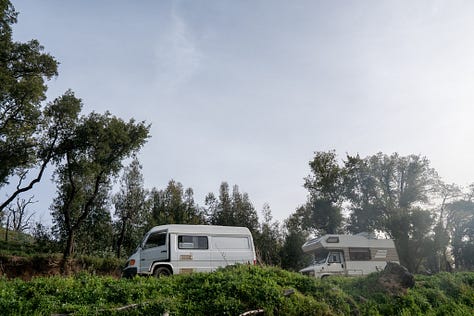

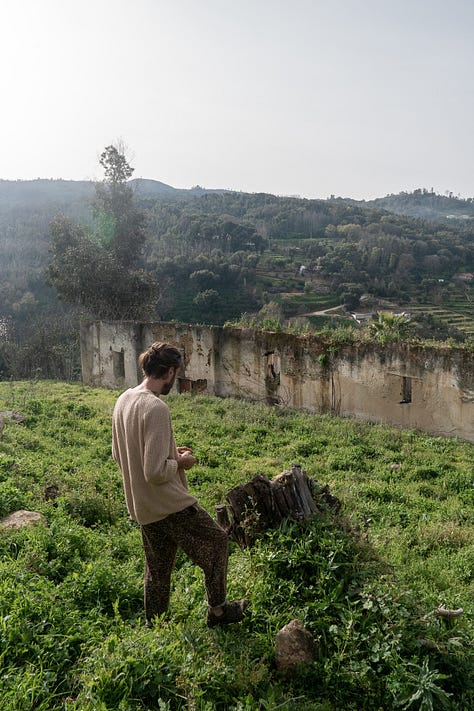
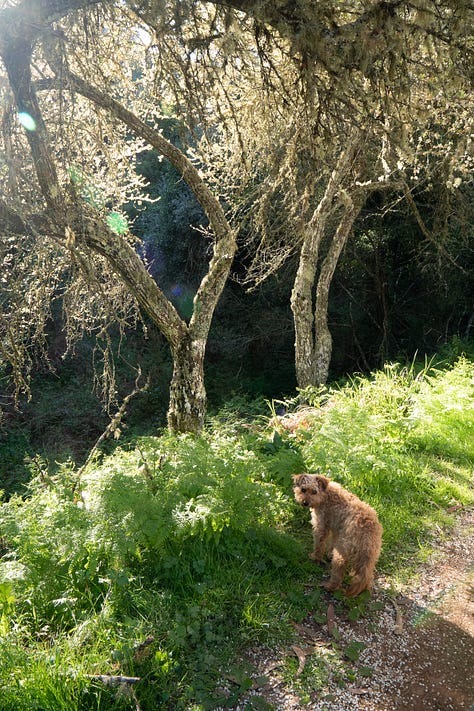
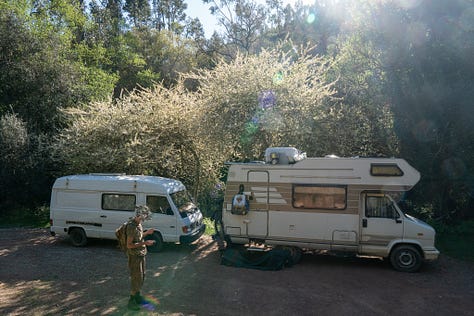
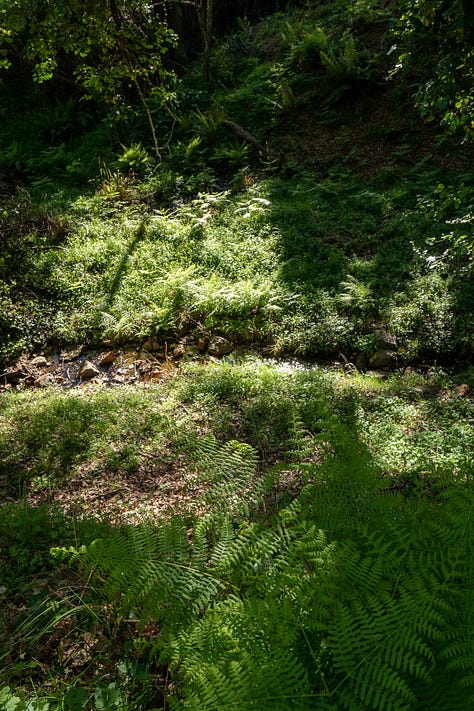
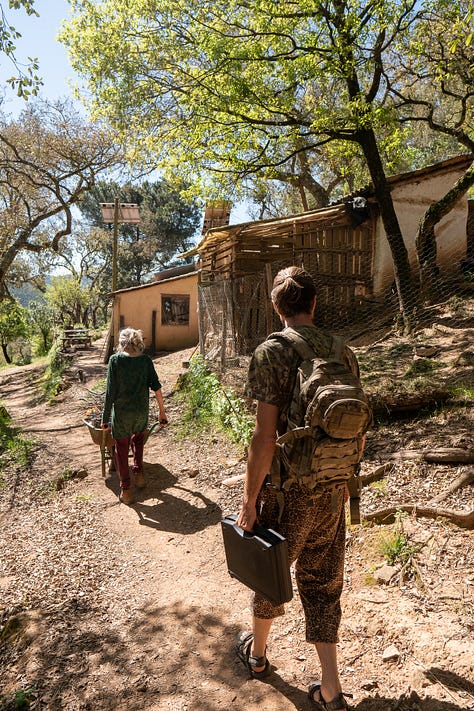
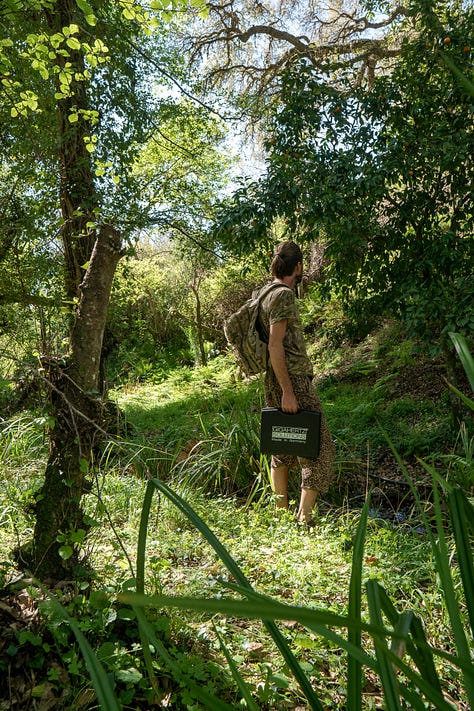
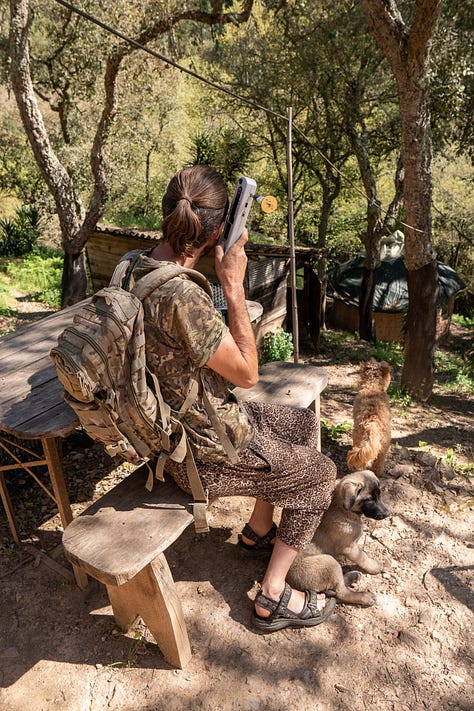


Reading about you experience with this gentleman really intrigued me as much as he intrigued you. He reminded me of a wizard or warlock, like Radagast. Someone allied with animals companions, using nature to assist in his endeavors, even if some methods are perceived as unorthodox. A bit odd, but the connection seemed interesting. Guess it goes to show that you can learn from unexpected sources.
And who knows, maybe your paths will intersect in the future.